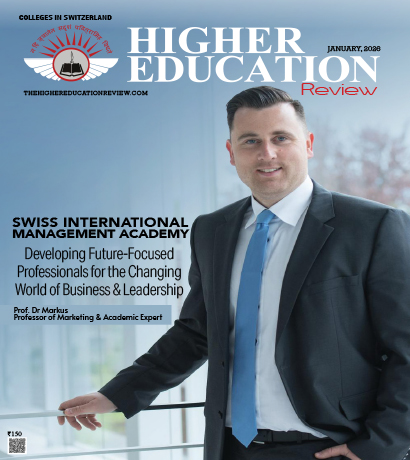Key Strategies for Students to Secure Jobs in the IT Industry
 In a conversation with Higher Education Review, Krupa N S, CHRO, Xoriant, shared her insights on how students can adequately prepare for a career in the constantly changing IT industry. She emphasized the importance of lifelong learning, developing a personal brand, and a combination of both technical skills and soft skills to be standout in a competitive job market. She also highlights strategies for further enhancing skills through project-based learning, certification programs, active professional networking, and communication skills.
In a conversation with Higher Education Review, Krupa N S, CHRO, Xoriant, shared her insights on how students can adequately prepare for a career in the constantly changing IT industry. She emphasized the importance of lifelong learning, developing a personal brand, and a combination of both technical skills and soft skills to be standout in a competitive job market. She also highlights strategies for further enhancing skills through project-based learning, certification programs, active professional networking, and communication skills.
What strategies would you recommend for students to stay updatable and continue learning in the ever-changing IT industry?
Whether as a student or a professional, it is essential to adopt a lifelong learning approach. Being a lifelong learner is extremely important for Engineering and IT industry professionals. Improving general knowledge is crucial. There are several contents available to learn technologies, learning platforms such as Udemy and other online programs helps to learn new technologies. It does take some discipline and commitment.
Networking is essential to stay involved with industry conversations, trends, and developments. Beyond technical skills, soft skills play a big role in career development. It is important to focus on soft skills, including the ability to connect and communicate with people, because to become a part of the industry it is important to be immersed in the industry.
What are some unique strategies students can use to differentiate themselves in the competitive IT job market?
In today's competitive world, individuals must create unique value something that helps them stand out from other people in the industry. To become unique among others, it is important to create a personal branding. Developing personal branding involves engaging with technology, publishing papers, articles and participate in professional communities. Experience matters a lot when you want to distinguish yourself from others.
Experience not only includes work experience in the industry, however, students can develop creative projects and gain hands on experience by collaborating with seniors, working with professional networks or through internships. Working on real time projects helps to gain confidence and it will add authenticity when attending any interviews. These kinds of projects need not be real all the time, even if it is a simple or dummy project it can still be valuable.
In addition to hands-on experience, certifications play a big part in continuous professional development. Nowadays, there are countless opportunities to participate in certification programs to enhance and build skills. Earlier time, knowledge was much less accessible and required physical texts, today generation has a vast resource option through the internet. Networking platforms such as LinkedIn are great resources for connecting with industry people and joining useful conversations.
Active involvement in the professional group or community, not only enhances knowledge but also builds confidence. Similarly, a skill such as public speaking is equally vital. Communication is not a skill that can be learned overnight; it requires practice over time. For every four years of studies, students should seek opportunities to develop their soft skills at the same time develop their technical skills.
Moreover, there are fundamental components for building a personal brand. It is critical to make connections beyond personal networks and circles, focus on developing soft skills, pursue professional certifications, and participate in project-based learning. If it is through internships or real-time, obtaining practical exposure is essential. Finding dummy project ideas and working with associates through organized group effort can improve technical and interpersonal skills. Working in groups or with teams can be an effective way to learn, grow, and be innovative.
Soft skills such as communication, problem solving, and teamwork are critical in the IT industry. How can students develop these skills while studying?
In today’s work environment, soft skills are key to being recognized and standing out among peers. The reality is that the decision to prefer one person over another is often determined by how a person presents themselves, their accomplishments, and how clearly they can present their ideas. This is incredibly significant, and there are a few key steps towards developing such skills. Connecting with people and establishing meaningful professional connections is very crucial.
Moreover, for individuals who want to acknowledge they need to work on communication skills, it is important to act on this as soon as possible. Colleges and institutions also play a crucial role in this process. Timely and continued intervention can greatly improve communication ability, as students will become confident communicators by the time they are enter the workforce as professionals. However, students also need to take responsibility to invest time and energy into building these skills.
For students who have a passion for writing, there are some opportunities through blogging or publishing articles on platforms such as LinkedIn or on an academic forum. Expressing ideas effectively creates understanding, and people communicating clearly are much more likely to be chosen and trusted especially within a global work environment. In today’s professional world, the ability to communicate ideas and thoughts is equally as important as one’s technical expertise.
What are some common pitfalls that students should avoid when seeking their first job in the IT industry? How can they better prepare for the transition?
While discussing common pitfalls faced when entering the IT industry, one of the most important variables is a combination of ability and attitude in multiple professional environments. Often, many people enter the workforce at the same time, for instance - all in the same training. In such cases, it becomes important to distinguish oneself through proactive engagement. To be able to identify problems early, to be able to show effective problem-solving, and communicate clearly with managers or trainers conducting the sessions. Taking initiative, articulating thoughts, and offering constructive ideas not only reflect one’s engagement but also highlight potential for growth and leadership within the organization.
When applying for a job, one of the important part is how people present and brand themselves, primarily through their resume. An average resume will not stand out unless there is a special academic achievement. Thus, it becomes more important to create an effective resume. A good resume is built on various meaningful experiences. This includes live projects, exposure to real work, good soft skills, or even extra-curricular activities. In the case of fresh graduates, it is excellent if the resume mentions taking part in a few hackathons, performing at college festivals, taking part in the quizzes, working on a project that had a significant impact, or doing various internships throughout their studies. All these experiences add a great level of uniqueness to a profile.
A resume that showcases only academic grades, or grades without any practical involvement and evidence of initiative, is not very impressive. In an increasingly competitive world, it is important to draw on various technical skills, soft skills, and participation in other modes or possibilities for learning and development, to build a personal brand.
It is equally vital to examine the approach taken for how to prepare for interviews. Interview preparation must extend beyond just thinking about technical questions. To prepare adequately, candidates should think about participating in mock group conversations and mock interviews. Preparing with a well-balanced approach involving a technical and a behavioral preparation aspect is vital to ensure strong performance in interviews and a lasting impression.
As AI and automation reshape the IT job market, what new opportunities should students look out for in the next three to five years?
Technologies that were once innovative five years ago are now commonplace. Artificial intelligence (AI) is one of the most popular technologies today and a key focus of many organizations and professionals. A few promising areas of focus are data/AI integration, cloud native DevOps, machine learning (ML), ethical AI, and analytics. Even in testing and automation, the field has expanded to include several new specialties. Currently, there are a wide range of skills and technologies available, especially in the digital engineering space. Risk and compliance, and cybersecurity have become very important, and large areas of change continue to happen in those domains.
The focus of the professional world today reflects the emerging field of study and those emerging domains, providing a huge emphasis on data and artificial intelligence. While legacy technologies (like COBOL) exist in some systems, their significance is diminishing in the current digital age.
Organizations that provide IT services have shifted dramatically to focus on data-based solutions and artificial intelligence-based innovation. For instance, undergraduate students starting college now might encounter entirely new technologies when they graduate. It is important to stay on top of and adapt to this rapidly changing technology.

